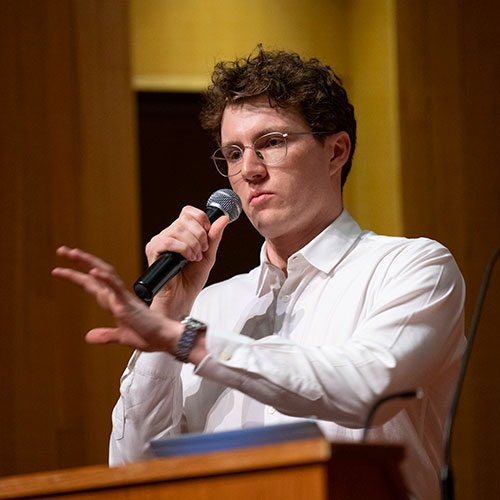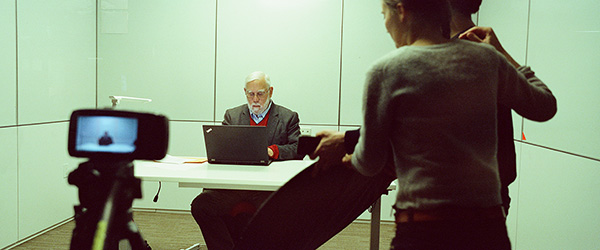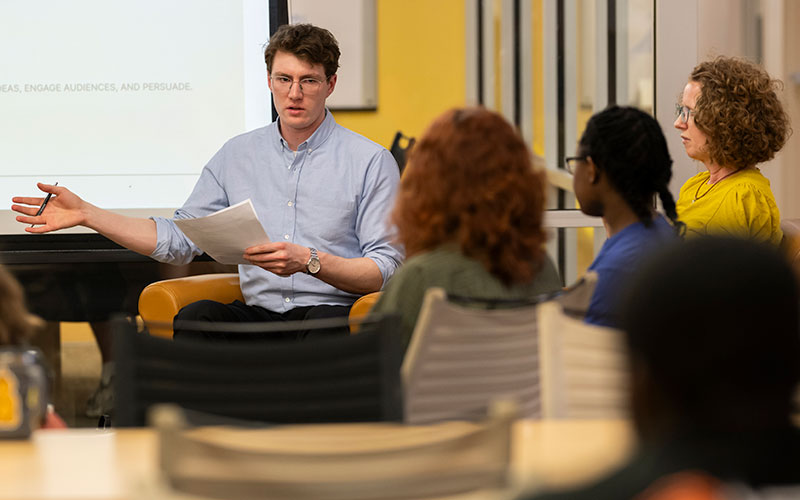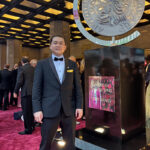
I.S. research inspires John Trainor ’16 to advocate for information transparency

In a world filled with information, it becomes more important and harder to determine what is true. For John Trainor ’16, a history alumnus from The College of Wooster, this lesson came from an unexpected place: a short Wikipedia article on a little-known historical event: the Norwegian rocket incident, a nuclear false alarm that took place in Russia in 1995. What began as a moment of curiosity turned into his senior Independent Study research project, and later, a years-long deep dive into the importance of accuracy in an increasingly information-driven world and the creation of a full documentary on the event called Sound the Alarm.
What intrigued Trainor about the Norwegian rocket incident was the lack of detail and background available. In 1995, a Norwegian and American scientific team launched a rocket to study the northern lights, but a miscommunication led the Russian military to fear an incoming nuclear attack. Trainor learned through his research that some claimed the event went all the way to Russian president Boris Yeltsin, who had only minutes to decide whether there was a real threat and if Russia should launch an attack against the United States. “I stumbled across it on Wikipedia the summer before my senior year, and the entry was quite vague. It was really just two sentences about how a science experiment led to some misunderstanding in Russia,” he explained.
Mentored by Keith Rathbone, former visiting assistant professor of history at Wooster, Trainor took it upon himself to explore the history of this little-known event by traveling to interview many figures who were directly involved with the event. With Henry J. Copeland Funding, a College fund dedicated to assisting seniors conducting their I.S. research, Trainor traveled to Washington, D.C., to conduct video interviews with Steven Pifer, the former U.S. ambassador to Ukraine, and Peter Pry, a former nuclear weapons analyst with the Central Intelligence Agency, to begin his project. Trainor found that Pry and Pifer shared his interest in sharing information about what happened and how it applies to similar situations. “Pry was especially adamant about these issues and false alerts, how a misunderstanding can escalate,” said Trainor. “He was part of a House Armed Services Committee and actively working with Congress on these issues.”
In many of his classes with Greg Shaya, Henry J. and Laura H. Copeland Professor of European History who also teaches global media & digital studies, Trainor learned how to analyze film through a historical lens and how films reflect the historical context in which they were created. He then applied those lessons to his own research He decided that the best way to share this research would be to create a documentary film on the event because, as he learned in Shaya’s classes, “Film can bring stories to life, reach an audience, and communicate in a different way than just writing a paper,” he said.

While working on the documentary, Trainor traveled to interview a variety of experts in international security and nuclear weapons, including Theodore Postol, professor emeritus at Massachusetts Institute of Technology.
After turning in a 30-minute film along with a more traditional paper for his I.S., Trainor’s time at Wooster came to a close with graduation, but his journey of studying the Norwegian rocket incident was not finished. Wanting new perspectives on the event and to get closer to the truth, he moved to Berlin, Germany, and spent the next six years researching and filming to expand his documentary. With funding from the Norwegian Film Institute, North Norwegian Film Center, and Fritt Ord (Freedom of Speech) Foundation, Trainor and his team continued the project in hopes of fully understanding and communicating what happened. Interviewing Norwegian scientists involved with the team that launched the rocket and retired Russian military officers on duty at the time of the incident, Trainor uncovered new viewpoints and information that helped not only with the creation of the film, but also the overall historical understanding of this little-known incident.
“In some ways, investigative work can be never-ending. There’s always something more to learn, and this project was constantly evolving. I went into it feeling like I had a good understanding of what happened, only to meet with people in Russia and hear a completely different perspective.”

Trainor shared his passion for storytelling in a workshop with students at Wooster.
Once Trainor finished the film, it was shown at several Norwegian film festivals where it received positive responses. “Norway is a country that has a lot of activism, and there’s a strong desire to get involved in politics,” Trainor said. While he knows that the film will not solve problems of nuclear dangers and misinformation single-handedly, he hopes that it will play a part in larger discussions about these topics. “As long as there’s some attention directed towards an issue, you can start to see some changes in policy around the world,” he explained.
Trainor’s passion for telling the story of the incident is not just academic curiosity but also based on the real-life dangers that disinformation and misinformation can cause. “Once I got into this project, and started hearing from people who were so alarmed about everything that was happening, that drew me in to want to learn more and understand what the modern nuclear danger looks like, and try to get that message out, especially to people of my generation and younger, who grew up after the Cold War, and don’t have thememory of that,” Trainor explained.
By trying to understand an event where disinformation almost led to disaster, Trainor uncovered his enthusiasm for work dealing with principles of information literacy, trust, and transparency more broadly. After completing Sound the Alarm, Trainor moved away from filmmaking but continues working in areas where information transparency is vital. Running his own marketing consulting firm in New York City, he partners with technology companies on issues including digital trust and wants to continue working to promote the value of clear and open communication. “Anything dealing with content, information, or digital trust is really where my passions are,” Trainor said. “By creating this film, I was able to explore these ideas one step further, not only talking about the problem, but also some solutions.
Posted in Alumni, Magazine on May 10, 2024.
Related Posts
Related Areas of Study
History
Critically examine events and societies of the past and learn to tell the stories future generations need to know
Major MinorGlobal Media & Digital Studies
Digital technology, mass media and film studies are part of a dynamic, interdisciplinary course of study
Major MinorGlobal & International Studies
Learn about global challenges and issues using methods in economics, history, and political science coupled with language immersion and study abroad
Major

